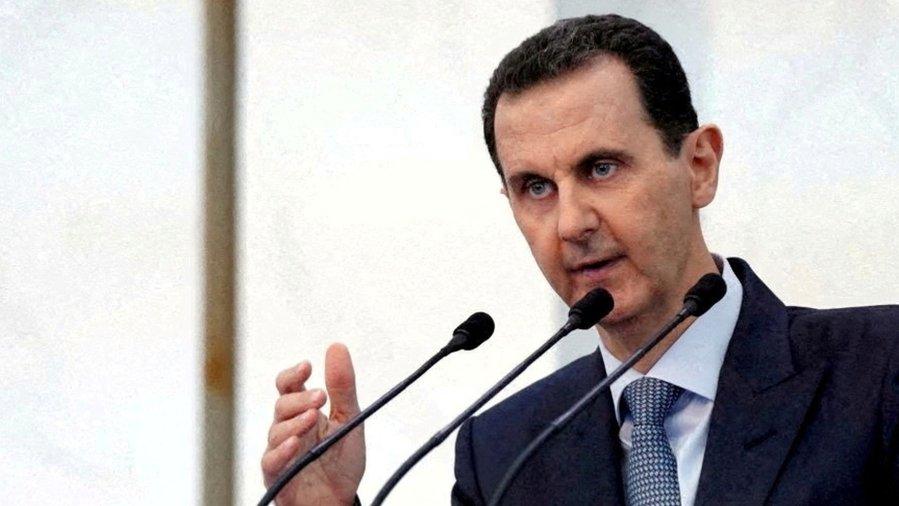Syria war: 'This is the price we had to pay for freedom'
- Published
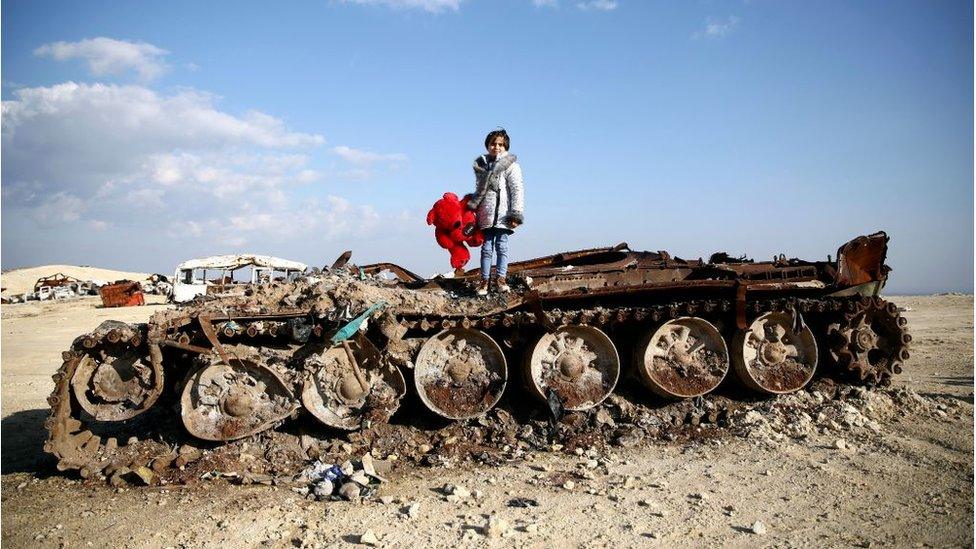
Ten years of war in Syria has devastated the country, claiming hundreds of thousands of lives and uprooting millions more. Here, some of those affected - displaced from their homes or driven abroad - describe the impact the conflict has had on them.
'I lost so many friends'
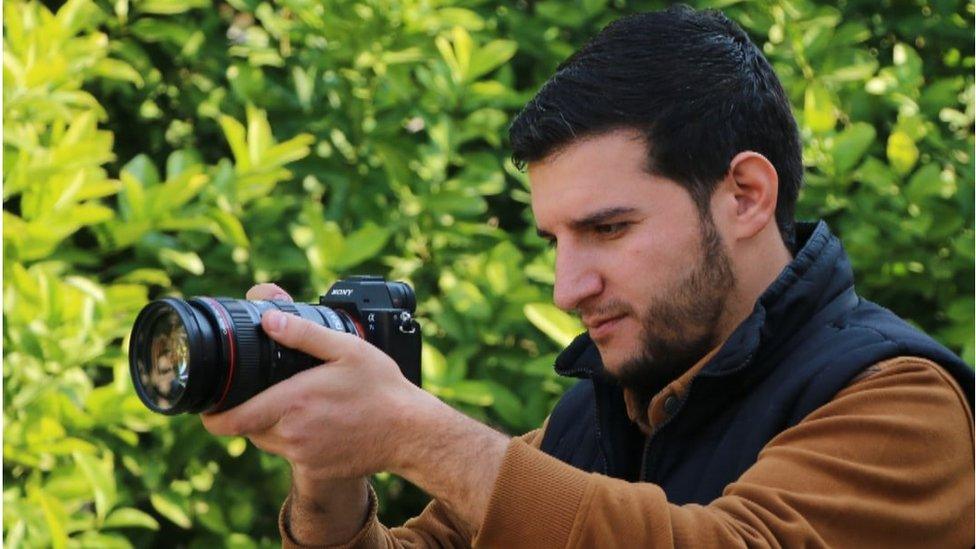
Ghayath Abou Ahmed, 30, freelance journalist
I was a student when protests broke out in my hometown Darayya. I watched from a distance with my camera, taking pictures of scenes I never imagined would have taken place in Syria. We were inspired by protests in Tunisia and Egypt, but never thought we would dare raise our voices too.
Sadly, our dream was short-lived when hundreds in Darayya were killed in August 2012. I lost so many of my friends and neighbours in just two days. That was the most difficult time for me in the whole of the last 10 years. That was the moment, fear had a full grip on all of the young people in Darayya. Nobody could go out of town again to protest.
For four years, we lived in isolation under siege. I felt bitter every time I looked at the horizons to see how Damascus was all lit brightly while we lived in complete darkness. My heart ached at how they moved freely while we couldn't even get food or medicine.
I was completely lost when I was forcibly evacuated from Darayya to Idlib in 2016; I felt like a fish taken out of water.
My parents were detained for a while and my brother was killed. This is the price we had to pay for freedom. I never regretted participating in the revolution. If I went back in time, I would do it all over again. I never blamed the revolution for my loss, I only blame the Syrian regime which committed unforgivable crimes.
It is true that the revolution has not succeeded yet, but we have achieved some freedom that we had never enjoyed before. There was always one voice that nobody dared contradict. Now I'm a freelance journalist, I write my thoughts and share them with the world, something I could have never done if it wasn't for the revolution.

'I have no dreams for the future'
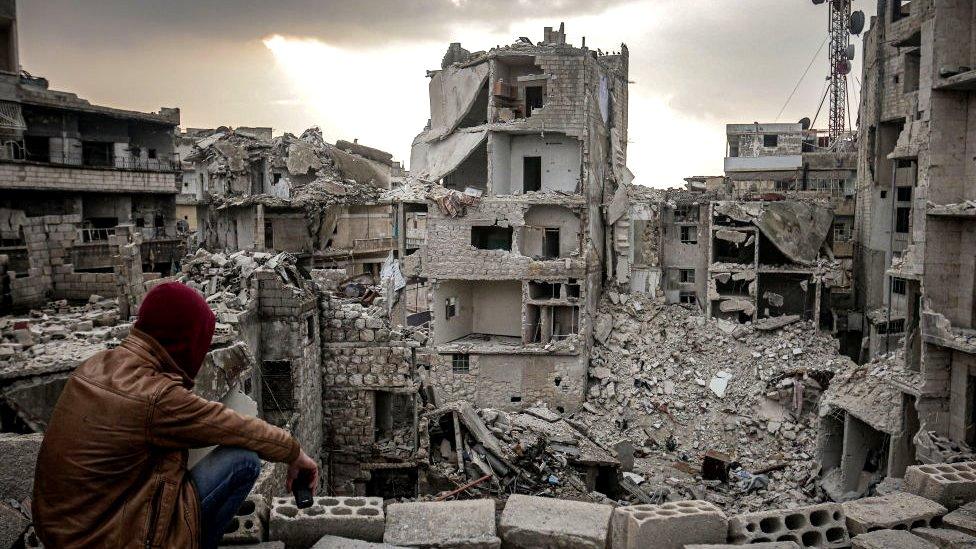
Shelling and air strikes has damaged much of Idlib (file photo)
Nour al-Sham, 28, humanitarian worker
I used to live in a house with my family, but now I live in a tent in northern Idlib.
We lived in southern Idlib in a house where we had everything we needed except for our freedom. Now I suffer in a primitive tent in a barren land with hundreds of other tents which in winter turns into a big mud puddle and in summer is infested with insects and covered in dust.
I have no dreams for the future or for my son's future. I try my best to distract him from life in the camp. I tell him nothing about the war so he doesn't get burdened at such a young age. My husband had to leave us to work in Turkey and I don't get to see him anymore.
I had a dream to finish school, but it's impossible now. I was a student in Aleppo University when I took part in the protests there. I had to leave the university few months after that because of threats by security forces.
I started helping out people and joined the humanitarian relief effort. In 2019 I escaped the shelling on our neighbourhood with my husband and our child and ended up in a refugee camp in the northern Idlib countryside.
I lost two of my cousins when their homes were bombarded. My brother was arrested in 2012, and we don't know where he is until now. But I never regretted that we had a revolution. We hoped we'd get rid of the oppressive regime.

'The world was watching and did nothing'
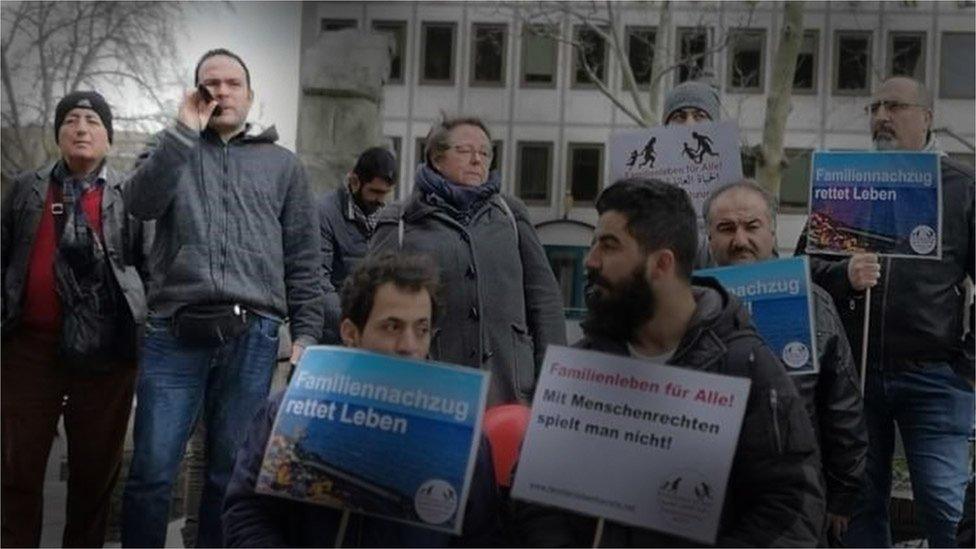
Fadi Mosilli, 40, Red Cross employee
By the end of 2012, I realised I couldn't stay in Syria anymore. I felt threatened after my close friends were arrested. I was afraid for the safety of my children. I was afraid I'd be just another man killed and forgotten like the prisoners of Caesar prison.
I found my way to Turkey then to Germany.
Probably being abroad helped make our voices heard. I've always participated in protests in Germany to call for the rights of Syrians and defend Syrian refugees. I even joined a political party. I dream of a similar democracy and free elections in Syria.
We took to the streets to call for freedom only for the regime to retaliate with bullets. People were brutally beaten and killed in front of my eyes.
The last 10 years of destruction took their painful toll on me, but I still have hope that one day we'll enjoy freedom and put those accountable behind bars. Seeing Syrians getting killed and displaced every day is heart-wrenching for me. The whole world was watching and did nothing to stop the killing.
I live as a body without a soul. I miss my life in Syria, I miss my family and my friends, the trees and the street where I lived. I look at pictures of Damascus where we used to live and I cry. It breaks my heart that I couldn't even visit my mom's grave after she passed away a couple of years ago.

'The past 10 years left me shattered'
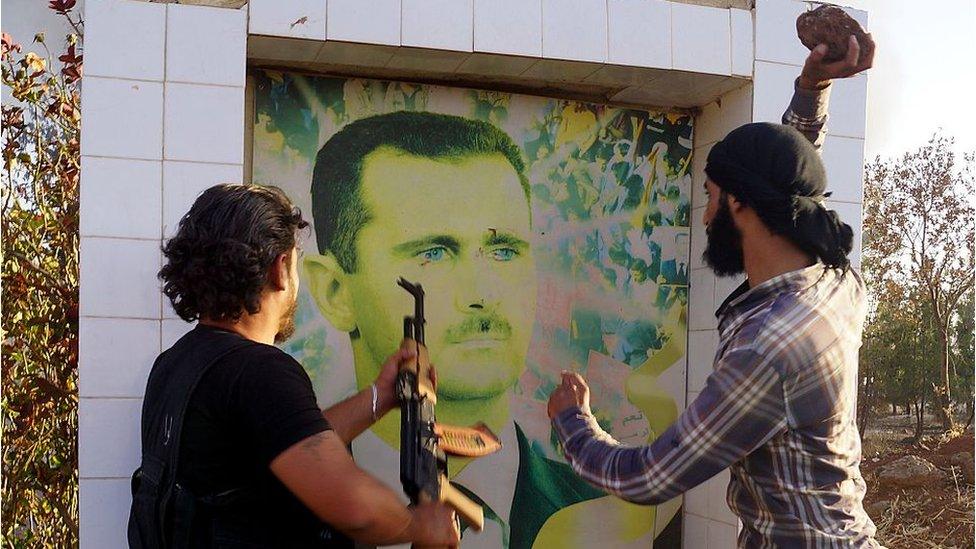
Syrian opposition fighters damage a portrait of Assad (file photo)
Sarah Ramy, 40, teacher
When the protests erupted, I was too scared to leave my house [in Damascus]. I didn't understand what was going on and what this could lead to. The protests were spontaneous, but people really needed to be organised and seek a leader. I was very worried because while some people did call for freedom, others raised signs with sectarian demands stirring hard feelings among Syrians of different faiths.
We have always lived together, all sects of Muslims and Christians, and before the crisis we never felt different. But a few months on, I lost some of my university friends who started questioning people around them about their sect and their towns.
As the years went by, shells continued to fall on us and we didn't even know who was firing. My sister was killed in 2016 in the Damascus countryside when she was in a restaurant. I don't blame the simple protesters for her death. I know they were calling for their basic rights, but others became fanatics and terrorised us.
Dozens of small armed groups were scattered killing people based on their identities. Government employees were being killed just because they worked with the government. That made me terrified for my mother's safety because she works in one of the government's ministries. Her bus was once targeted by shells on her way from work but she made it back home.
The past 10 years left me shattered. My heart races and my whole body shakes when I hear loud sounds. I've become obsessed with one idea every time I get in a taxi on my way home - that an explosion will take place this very minute.
It might be safer now, but the economic situation is unbearable. I hope that with this new American administration, the sanctions on Syria could be lifted. It's the ordinary people who suffer the most, not the people working in the government. It's always us who pay the price.

'We have won after all'
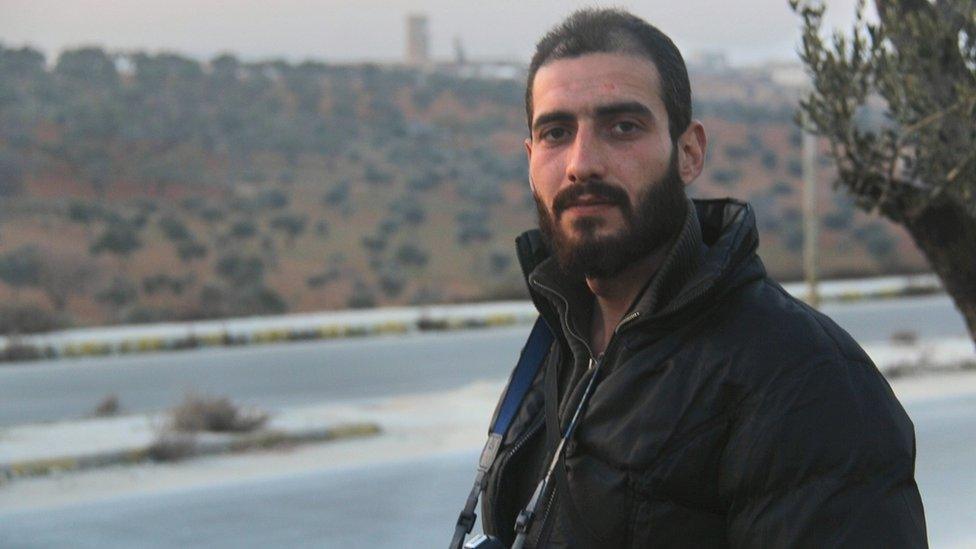
Harun al-Aswad, 33, journalist
On June 24, in 2012, I was watching on television how Egyptians achieved victory by announcing Mohammed Morsi a president for their country. I was inspired by the Egyptian revolution, dreaming of a happy ending to our struggle. On that day, I left my house [in Damascus] to participate in a protest, but my hopes were soon crushed when I got arrested.
For a year, I was tortured brutally. I was deprived of food and water and using the bathroom. I was beaten daily and mocked for the jailers' entertainment.
Sometimes I wished I could just die; and I think if I lost hope, I would have been dead.
I've always had a passion for telling stories, something my father warned me about. He said journalism in this country will get you in trouble one day. There were times when I thought about his words while fleeing one place after the other to avoid getting arrested.
I live in Turkey now close to the Syrian borders where I continue to do more journalism and tell the world about the atrocities committed against the Syrian people. I still have hope that Bashar al-Assad and his regime will be held accountable for his crimes against the Syrian people.
Our revolution was not Islamic. The rallies moved to mosques just because they were places of gathering for us on Friday. Moving in crowds gave us strength and eliminated our fear. We never called for sectarian demands, we only called for freedom, justice, and an end to the emergency state.
We have won after all, because it was us versus powerful countries and we still managed to overcome our fear and break the deafening silence of decades of oppression exposing unspeakable atrocities.

'I have no hope of seeing my family again'
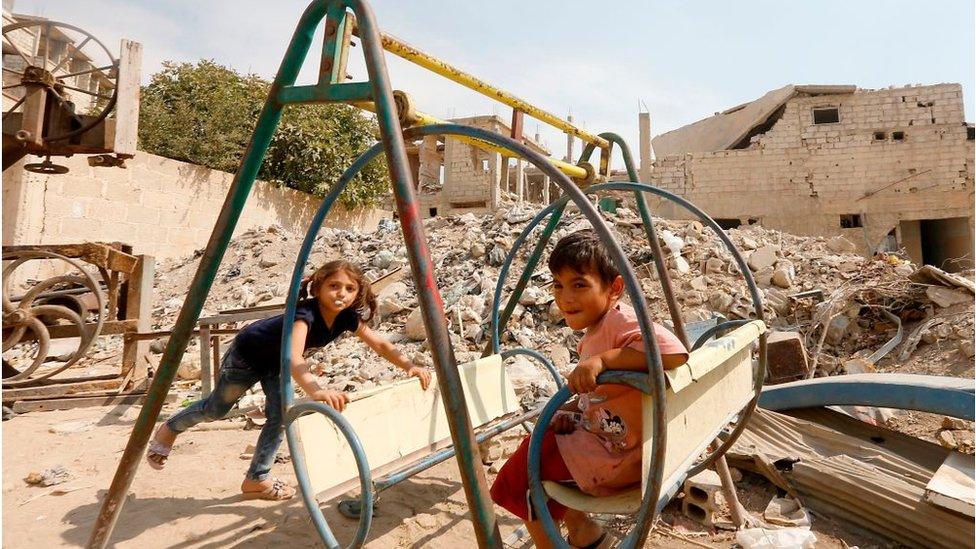
Children play among debris in Eastern Ghouta (file photo)
Safia, 45, housewife
I escaped from Homs with my husband and our four children one year after the revolution began. We have always thought we would be back once the regime stopped its attack. But we couldn't come back.
We were moving in a pick-up truck amid heavy fire from one town to another heading to safety in the north. Whenever we imagined we were finally safe, the sound of shelling would bring us back to reality. Death was close but it was better than being arrested.
The most difficult time for us was living under siege in Eastern Ghouta. The regime was hitting us with everything, airstrikes, artillery, mortars, cluster bombs. They denied us medicine and basic food supplies. The only thing we could find to eat was cabbage leaves. I was dying inside when my youngest son woke up hungry in the middle of the night asking for food and I couldn't get him anything. Many terrible things happened to me that I wish could be erased from my memory.
My husband and three of my sons were tortured by Turkish security for being journalists when we tried to escape from Idlib to Turkey. I was screaming at the officer "leave them alone". I don't know how I got all this strength. I used to be terrified of any officer. I probably exploded after all the injustice and humility we'd seen.
The Turkish authorities apologised to us later, saying it was an individual mistake.
We were allowed in Turkey, stayed for few months then moved to France.
I have no hope of seeing my family again. My father died and I couldn't see him one last time. But I still believe that the revolution was something that was meant to happen. We were silent for so long. People were even scared to talk inside their homes. But enough was enough.

'Like a leaf that fell from a tree'
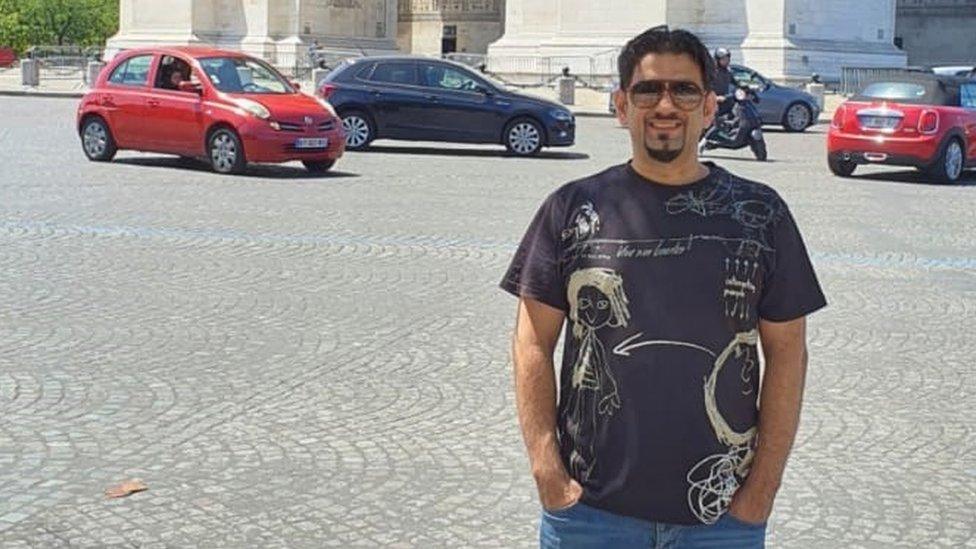
Younes al-Karim, 40, economist
Before the revolution, I was an economic advisor to notable Syrian businessmen. Now living in France, even though I have a master's degree, I have to earn my living by working as a cleaner in a restaurant.
I was arrested for few months in Syria in 2014 for trying to form a political party. When I was released, I knew my life was in danger and we had to flee.
My wife too has a master's degree and worked with the Central Bank but now she cooks meals for a living. The most depressing question anyone could ask me is "what do you do?"
I don't know how to answer this. Do I say I'm an economist and I used to teach economics in a university, or do I say I work in a kitchen of a restaurant?
Sometimes I ask myself: What do I do here? I feel I'm like a leaf that fell from a tree onto hostile ground that will never accept me. A French man once screamed at us to go back to where we came from and called us terrorists. Nobody stopped him. Nobody intervened to protect us.
Names of some of the interviewees have been changed to protect their identities.
Related topics
- Published2 May 2023

- Published9 December 2024
